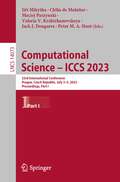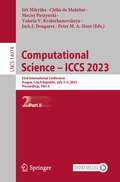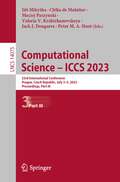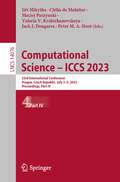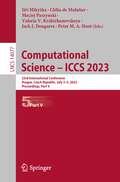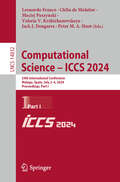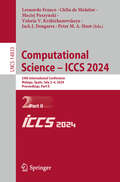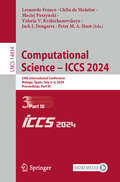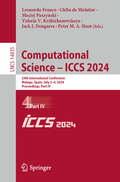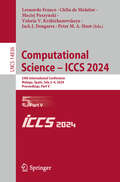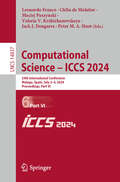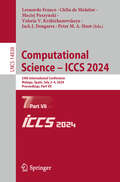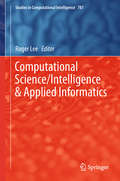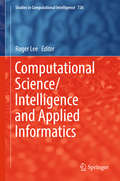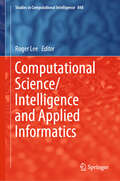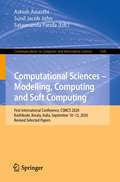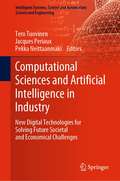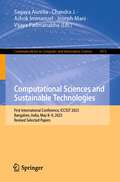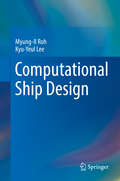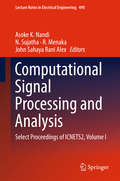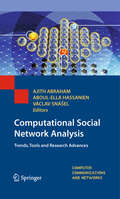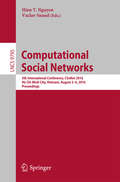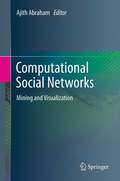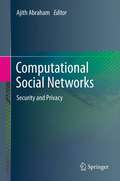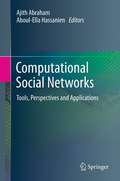- Table View
- List View
Computational Science – ICCS 2023: 23rd International Conference, Prague, Czech Republic, July 3–5, 2023, Proceedings, Part I (Lecture Notes in Computer Science #14073)
by Valeria V. Krzhizhanovskaya Jack J. Dongarra Peter M. A. Sloot Maciej Paszynski Clélia De Mulatier Jiří MikyškaThe five-volume set LNCS 14073-14077 constitutes the proceedings of the 23rd International Conference on Computational Science, ICCS 2023, held in Prague, Czech Republic, during July 3-5, 2023. The total of 188 full papers and 94 short papers presented in this book set were carefully reviewed and selected from 530 submissions. 54 full and 37 short papers were accepted to the main track; 134 full and 57 short papers were accepted to the workshops/thematic tracks. The theme for 2023, "Computation at the Cutting Edge of Science", highlights the role of Computational Science in assisting multidisciplinary research. This conference was a unique event focusing on recent developments in scalable scientific algorithms, advanced software tools; computational grids; advanced numerical methods; and novel application areas. These innovative novel models, algorithms, and tools drive new science through efficient application in physical systems, computational and systems biology, environmental systems, finance, and others.
Computational Science – ICCS 2023: 23rd International Conference, Prague, Czech Republic, July 3–5, 2023, Proceedings, Part II (Lecture Notes in Computer Science #14074)
by Valeria V. Krzhizhanovskaya Jack J. Dongarra Peter M. A. Sloot Maciej Paszynski Clélia De Mulatier Jiří MikyškaThe five-volume set LNCS 14073-14077 constitutes the proceedings of the 23rd International Conference on Computational Science, ICCS 2023, held in Prague, Czech Republic, during July 3-5, 2023. The total of 188 full papers and 94 short papers presented in this book set were carefully reviewed and selected from 530 submissions. 54 full and 37 short papers were accepted to the main track; 134 full and 57 short papers were accepted to the workshops/thematic tracks. The theme for 2023, "Computation at the Cutting Edge of Science", highlights the role of Computational Science in assisting multidisciplinary research. This conference was a unique event focusing on recent developments in scalable scientific algorithms, advanced software tools; computational grids; advanced numerical methods; and novel application areas. These innovative novel models, algorithms, and tools drive new science through efficient application in physical systems, computational and systems biology, environmental systems, finance, and others.
Computational Science – ICCS 2023: 23rd International Conference, Prague, Czech Republic, July 3–5, 2023, Proceedings, Part III (Lecture Notes in Computer Science #10475)
by Valeria V. Krzhizhanovskaya Jack J. Dongarra Peter M. A. Sloot Maciej Paszynski Clélia De Mulatier Jiří MikyškaThe five-volume set LNCS 14073-14077 constitutes the proceedings of the 23rd International Conference on Computational Science, ICCS 2023, held in Prague, Czech Republic, during July 3-5, 2023. The total of 188 full papers and 94 short papers presented in this book set were carefully reviewed and selected from 530 submissions. 54 full and 37 short papers were accepted to the main track; 134 full and 57 short papers were accepted to the workshops/thematic tracks. The theme for 2023, "Computation at the Cutting Edge of Science", highlights the role of Computational Science in assisting multidisciplinary research. This conference was a unique event focusing on recent developments in scalable scientific algorithms, advanced software tools; computational grids; advanced numerical methods; and novel application areas. These innovative novel models, algorithms, and tools drive new science through efficient application in physical systems, computational and systems biology, environmental systems, finance, and others.
Computational Science – ICCS 2023: 23rd International Conference, Prague, Czech Republic, July 3–5, 2023, Proceedings, Part IV (Lecture Notes in Computer Science #10476)
by Valeria V. Krzhizhanovskaya Jack J. Dongarra Peter M. A. Sloot Maciej Paszynski Clélia De Mulatier Jiří MikyškaThe five-volume set LNCS 14073-14077 constitutes the proceedings of the 23rd International Conference on Computational Science, ICCS 2023, held in Prague, Czech Republic, during July 3-5, 2023. The total of 188 full papers and 94 short papers presented in this book set were carefully reviewed and selected from 530 submissions. 54 full and 37 short papers were accepted to the main track; 134 full and 57 short papers were accepted to the workshops/thematic tracks. The theme for 2023, "Computation at the Cutting Edge of Science", highlights the role of Computational Science in assisting multidisciplinary research. This conference was a unique event focusing on recent developments in scalable scientific algorithms, advanced software tools; computational grids; advanced numerical methods; and novel application areas. These innovative novel models, algorithms, and tools drive new science through efficient application in physical systems, computational and systems biology, environmental systems, finance, and others.
Computational Science – ICCS 2023: 23rd International Conference, Prague, Czech Republic, July 3–5, 2023, Proceedings, Part V (Lecture Notes in Computer Science #10477)
by Valeria V. Krzhizhanovskaya Jack J. Dongarra Peter M. A. Sloot Maciej Paszynski Clélia De Mulatier Jiří MikyškaThe five-volume set LNCS 14073-14077 constitutes the proceedings of the 23rd International Conference on Computational Science, ICCS 2023, held in Prague, Czech Republic, during July 3-5, 2023. The total of 188 full papers and 94 short papers presented in this book set were carefully reviewed and selected from 530 submissions. 54 full and 37 short papers were accepted to the main track; 134 full and 57 short papers were accepted to the workshops/thematic tracks. The theme for 2023, "Computation at the Cutting Edge of Science", highlights the role of Computational Science in assisting multidisciplinary research. This conference was a unique event focusing on recent developments in scalable scientific algorithms, advanced software tools; computational grids; advanced numerical methods; and novel application areas. These innovative novel models, algorithms, and tools drive new science through efficient application in physical systems, computational and systems biology, environmental systems, finance, and others.
Computational Science – ICCS 2024: 24th International Conference, Malaga, Spain, July 2–4, 2024, Proceedings, Part I (Lecture Notes in Computer Science #14832)
by Valeria V. Krzhizhanovskaya Jack J. Dongarra Peter M. A. Sloot Maciej Paszynski Clélia De Mulatier Leonardo FrancoThe 7-volume set LNCS 14832 – 14838 constitutes the proceedings of the 24th International Conference on Computational Science, ICCS 2024, which took place in Malaga, Spain, during July 2–4, 2024. The 155 full papers and 70 short papers included in these proceedings were carefully reviewed and selected from 430 submissions. They were organized in topical sections as follows: Part I: ICCS 2024 Main Track Full Papers; Part II: ICCS 2024 Main Track Full Papers; Part III: ICCS 2024 Main Track Short Papers; Advances in High-Performance Computational Earth Sciences: Numerical Methods, Frameworks and Applications; Artificial Intelligence and High-Performance Computing for Advanced Simulations; Part IV: Biomedical and Bioinformatics Challenges for Computer Science; Computational Health; Part V: Computational Optimization, Modelling, and Simulation; Generative AI and Large Language Models (LLMs) in Advancing Computational Medicine; Machine Learning and Data Assimilation for Dynamical Systems; Multiscale Modelling and Simulation; Part VI: Network Models and Analysis: From Foundations to Artificial Intelligence; Numerical Algorithms and Computer Arithmetic for Computational Science; Quantum Computing; Part VII: Simulations of Flow and Transport: Modeling, Algorithms and Computation; Smart Systems: Bringing Together Computer Vision, Sensor Networks, and Artificial Intelligence; Solving Problems with Uncertainties; Teaching Computational Science
Computational Science – ICCS 2024: 24th International Conference, Malaga, Spain, July 2–4, 2024, Proceedings, Part II (Lecture Notes in Computer Science #14833)
by Valeria V. Krzhizhanovskaya Jack J. Dongarra Peter M. A. Sloot Maciej Paszynski Clélia De Mulatier Leonardo FrancoThe 7-volume set LNCS 14832 – 14838 constitutes the proceedings of the 24th International Conference on Computational Science, ICCS 2024, which took place in Malaga, Spain, during July 2–4, 2024. The 155 full papers and 70 short papers included in these proceedings were carefully reviewed and selected from 430 submissions. They were organized in topical sections as follows: Part I: ICCS 2024 Main Track Full Papers; Part II: ICCS 2024 Main Track Full Papers; Part III: ICCS 2024 Main Track Short Papers; Advances in High-Performance Computational Earth Sciences: Numerical Methods, Frameworks and Applications; Artificial Intelligence and High-Performance Computing for Advanced Simulations; Part IV: Biomedical and Bioinformatics Challenges for Computer Science; Computational Health; Part V: Computational Optimization, Modelling, and Simulation; Generative AI and Large Language Models (LLMs) in Advancing Computational Medicine; Machine Learning and Data Assimilation for Dynamical Systems; Multiscale Modelling and Simulation; Part VI: Network Models and Analysis: From Foundations to Artificial Intelligence; Numerical Algorithms and Computer Arithmetic for Computational Science; Quantum Computing; Part VII: Simulations of Flow and Transport: Modeling, Algorithms and Computation; Smart Systems: Bringing Together Computer Vision, Sensor Networks, and Artificial Intelligence; Solving Problems with Uncertainties; Teaching Computational Science
Computational Science – ICCS 2024: 24th International Conference, Malaga, Spain, July 2–4, 2024, Proceedings, Part III (Lecture Notes in Computer Science #14834)
by Valeria V. Krzhizhanovskaya Jack J. Dongarra Peter M. A. Sloot Maciej Paszynski Clélia De Mulatier Leonardo FrancoThe 7-volume set LNCS 14832 – 14838 constitutes the proceedings of the 24th International Conference on Computational Science, ICCS 2024, which took place in Malaga, Spain, during July 2–4, 2024. The 155 full papers and 70 short papers included in these proceedings were carefully reviewed and selected from 430 submissions. They were organized in topical sections as follows: Part I: ICCS 2024 Main Track Full Papers; Part II: ICCS 2024 Main Track Full Papers; Part III: ICCS 2024 Main Track Short Papers; Advances in High-Performance Computational Earth Sciences: Numerical Methods, Frameworks and Applications; Artificial Intelligence and High-Performance Computing for Advanced Simulations; Part IV: Biomedical and Bioinformatics Challenges for Computer Science; Computational Health; Part V: Computational Optimization, Modelling, and Simulation; Generative AI and Large Language Models (LLMs) in Advancing Computational Medicine; Machine Learning and Data Assimilation for Dynamical Systems; Multiscale Modelling and Simulation; Part VI: Network Models and Analysis: From Foundations to Artificial Intelligence; Numerical Algorithms and Computer Arithmetic for Computational Science; Quantum Computing; Part VII: Simulations of Flow and Transport: Modeling, Algorithms and Computation; Smart Systems: Bringing Together Computer Vision, Sensor Networks, and Artificial Intelligence; Solving Problems with Uncertainties; Teaching Computational Science
Computational Science – ICCS 2024: 24th International Conference, Malaga, Spain, July 2–4, 2024, Proceedings, Part IV (Lecture Notes in Computer Science #14835)
by Valeria V. Krzhizhanovskaya Jack J. Dongarra Peter M. A. Sloot Maciej Paszynski Clélia De Mulatier Leonardo FrancoThe 7-volume set LNCS 14832 – 14838 constitutes the proceedings of the 24th International Conference on Computational Science, ICCS 2024, which took place in Malaga, Spain, during July 2–4, 2024. The 155 full papers and 70 short papers included in these proceedings were carefully reviewed and selected from 430 submissions. They were organized in topical sections as follows: Part I: ICCS 2024 Main Track Full Papers; Part II: ICCS 2024 Main Track Full Papers; Part III: ICCS 2024 Main Track Short Papers; Advances in High-Performance Computational Earth Sciences: Numerical Methods, Frameworks and Applications; Artificial Intelligence and High-Performance Computing for Advanced Simulations; Part IV: Biomedical and Bioinformatics Challenges for Computer Science; Computational Health; Part V: Computational Optimization, Modelling, and Simulation; Generative AI and Large Language Models (LLMs) in Advancing Computational Medicine; Machine Learning and Data Assimilation for Dynamical Systems; Multiscale Modelling and Simulation; Part VI: Network Models and Analysis: From Foundations to Artificial Intelligence; Numerical Algorithms and Computer Arithmetic for Computational Science; Quantum Computing; Part VII: Simulations of Flow and Transport: Modeling, Algorithms and Computation; Smart Systems: Bringing Together Computer Vision, Sensor Networks, and Artificial Intelligence; Solving Problems with Uncertainties; Teaching Computational Science
Computational Science – ICCS 2024: 24th International Conference, Malaga, Spain, July 2–4, 2024, Proceedings, Part V (Lecture Notes in Computer Science #14836)
by Valeria V. Krzhizhanovskaya Jack J. Dongarra Peter M. A. Sloot Maciej Paszynski Clélia De Mulatier Leonardo FrancoThe 7-volume set LNCS 14832 – 14838 constitutes the proceedings of the 24th International Conference on Computational Science, ICCS 2024, which took place in Malaga, Spain, during July 2–4, 2024. The 155 full papers and 70 short papers included in these proceedings were carefully reviewed and selected from 430 submissions. They were organized in topical sections as follows: Part I: ICCS 2024 Main Track Full Papers; Part II: ICCS 2024 Main Track Full Papers; Part III: ICCS 2024 Main Track Short Papers; Advances in High-Performance Computational Earth Sciences: Numerical Methods, Frameworks and Applications; Artificial Intelligence and High-Performance Computing for Advanced Simulations; Part IV: Biomedical and Bioinformatics Challenges for Computer Science; Computational Health; Part V: Computational Optimization, Modelling, and Simulation; Generative AI and Large Language Models (LLMs) in Advancing Computational Medicine; Machine Learning and Data Assimilation for Dynamical Systems; Multiscale Modelling and Simulation; Part VI: Network Models and Analysis: From Foundations to Artificial Intelligence; Numerical Algorithms and Computer Arithmetic for Computational Science; Quantum Computing; Part VII: Simulations of Flow and Transport: Modeling, Algorithms and Computation; Smart Systems: Bringing Together Computer Vision, Sensor Networks, and Artificial Intelligence; Solving Problems with Uncertainties; Teaching Computational Science
Computational Science – ICCS 2024: 24th International Conference, Malaga, Spain, July 2–4, 2024, Proceedings, Part VI (Lecture Notes in Computer Science #14837)
by Valeria V. Krzhizhanovskaya Jack J. Dongarra Peter M. A. Sloot Maciej Paszynski Clélia De Mulatier Leonardo FrancoThe 7-volume set LNCS 14832 – 14838 constitutes the proceedings of the 24th International Conference on Computational Science, ICCS 2024, which took place in Malaga, Spain, during July 2–4, 2024. The 155 full papers and 70 short papers included in these proceedings were carefully reviewed and selected from 430 submissions. They were organized in topical sections as follows: Part I: ICCS 2024 Main Track Full Papers; Part II: ICCS 2024 Main Track Full Papers; Part III: ICCS 2024 Main Track Short Papers; Advances in High-Performance Computational Earth Sciences: Numerical Methods, Frameworks and Applications; Artificial Intelligence and High-Performance Computing for Advanced Simulations; Part IV: Biomedical and Bioinformatics Challenges for Computer Science; Computational Health; Part V: Computational Optimization, Modelling, and Simulation; Generative AI and Large Language Models (LLMs) in Advancing Computational Medicine; Machine Learning and Data Assimilation for Dynamical Systems; Multiscale Modelling and Simulation; Part VI: Network Models and Analysis: From Foundations to Artificial Intelligence; Numerical Algorithms and Computer Arithmetic for Computational Science; Quantum Computing; Part VII: Simulations of Flow and Transport: Modeling, Algorithms and Computation; Smart Systems: Bringing Together Computer Vision, Sensor Networks, and Artificial Intelligence; Solving Problems with Uncertainties; Teaching Computational Science
Computational Science – ICCS 2024: 24th International Conference, Malaga, Spain, July 2–4, 2024, Proceedings, Part VII (Lecture Notes in Computer Science #14838)
by Valeria V. Krzhizhanovskaya Jack J. Dongarra Peter M. A. Sloot Maciej Paszynski Clélia De Mulatier Leonardo FrancoThe 7-volume set LNCS 14832 – 14838 constitutes the proceedings of the 24th International Conference on Computational Science, ICCS 2024, which took place in Malaga, Spain, during July 2–4, 2024. The 155 full papers and 70 short papers included in these proceedings were carefully reviewed and selected from 430 submissions. They were organized in topical sections as follows: Part I: ICCS 2024 Main Track Full Papers; Part II: ICCS 2024 Main Track Full Papers; Part III: ICCS 2024 Main Track Short Papers; Advances in High-Performance Computational Earth Sciences: Numerical Methods, Frameworks and Applications; Artificial Intelligence and High-Performance Computing for Advanced Simulations; Part IV: Biomedical and Bioinformatics Challenges for Computer Science; Computational Health; Part V: Computational Optimization, Modelling, and Simulation; Generative AI and Large Language Models (LLMs) in Advancing Computational Medicine; Machine Learning and Data Assimilation for Dynamical Systems; Multiscale Modelling and Simulation; Part VI: Network Models and Analysis: From Foundations to Artificial Intelligence; Numerical Algorithms and Computer Arithmetic for Computational Science; Quantum Computing; Part VII: Simulations of Flow and Transport: Modeling, Algorithms and Computation; Smart Systems: Bringing Together Computer Vision, Sensor Networks, and Artificial Intelligence; Solving Problems with Uncertainties; Teaching Computational Science
Computational Science/Intelligence & Applied Informatics (Studies in Computational Intelligence #726)
by Roger LeeThis book presents the outcomes of the 5th ACIS International Conference on Computational Science/Intelligence & Applied Informatics (CSII 2018), which was held on July 10–12, 2018 in Yonago, Japan. The aim of the conference was to bring together researchers and scientists, businesspeople and entrepreneurs, teachers, engineers, computer users, and students to discuss the various fields of computer science, to share their experiences, and to exchange new ideas and information in a meaningful way. All aspects (theory, applications and tools) of computer and information science, the practical challenges encountered along the way, and the solutions adopted to solve them are all explored here. The conference organizers selected the best papers from among those accepted for presentation. The papers were chosen on the basis of review scores submitted by members of the program committee and subsequently underwent further rigorous review. Following this second round of review, 13 of the conference’s most promising papers were selected for this Springer (SCI) book. We eagerly await the important contributions that we know these authors will make to the field of computer and information science.
Computational Science/Intelligence and Applied Informatics (Studies in Computational Intelligence #726)
by Roger LeeThis book presents the scientific outcome of the 4th ACIS International Conference on Computational Science/Intelligence & Applied Informatics (CSII 2017), which was held on July 9-13, 2017 in Hamamatsu, Japan. The aim of this conference was to bring together researchers and scientists, businessmen and entrepreneurs, teachers, engineers, computer users, and students to discuss the numerous fields of computer science, to share their experiences and to exchange new ideas and information in a meaningful way. The book includes research findings concerning all aspects (theory, applications and tools) of computer and information science, and discusses the practical challenges encountered and the solutions adopted to address them. The book features 16 of the conference's most promising papers, written by researchers who are expected to make significant contributions in the field of computer and information science.
Computational Science/Intelligence and Applied Informatics (Studies in Computational Intelligence #848)
by Roger LeeThis book gathers the outcomes of the 6th ACIS International Conference on Computational Science/Intelligence & Applied Informatics (CSII 2019), which was held on May 29–31, 2019 in Honolulu, Hawaii. The aim of the conference was to bring together researchers and scientists, businesspeople and entrepreneurs, teachers, engineers, computer users, and students to discuss the various fields of computer science and to share their experiences and exchange new ideas and information in a meaningful way. Further, they presented research results on all aspects (theory, applications and tools) of computer and information science, and discussed the practical challenges encountered in their work and the solutions they adopted to overcome them. The book highlights the best papers from those accepted for presentation at the conference. They were chosen based on review scores submitted by members of the program committee and underwent further rigorous rounds of review. From this second round, 15 of the conference’s most promising papers were selected for this Springer (SCI) book and not the conference proceedings. We eagerly await the important contributions that we know these authors will make to the field of computer and information science.
Computational Sciences - Modelling, Computing and Soft Computing: First International Conference, CSMCS 2020, Kozhikode, Kerala, India, September 10-12, 2020, Revised Selected Papers (Communications in Computer and Information Science #1345)
by Sunil Jacob John Ashish Awasthi Satyananda PandaThis book constitutes revised and selected papers of the First International Conference on Computational Sciences - Modelling, Computing and Soft Computing, held in Kozhikode, Kerala, India, in September 2020. The 15 full papers and 6 short papers presented were thoroughly revised and selected from the 150 submissions. They are organized in the topical secions on computing; soft computing; general computing; modelling.
Computational Sciences and Artificial Intelligence in Industry: New Digital Technologies for Solving Future Societal and Economical Challenges (Intelligent Systems, Control and Automation: Science and Engineering #76)
by Pekka Neittaanmäki Tero Tuovinen Jacques PeriauxThis book is addressed to young researchers and engineers in the fields of Computational Science and Artificial Intelligence, ranging from innovative computational methods to digital machine learning tools and their coupling used for solving challenging industrial and societal problems.This book provides the latest knowledge from jointly academic and industries experts in Computational Science and Artificial Intelligence fields for exploring possibilities and identifying challenges of applying Computational Sciences and AI methods and tools in industrial and societal sectors.
Computational Sciences and Sustainable Technologies: First International Conference, ICCSST 2023, Bangalore, India, May 8–9, 2023, Revised Selected Papers (Communications in Computer and Information Science #1973)
by Sagaya Aurelia Chandra J. Ashok Immanuel Joseph Mani Vijaya PadmanabhaThis book constitutes the revised selected papers of the First International Conference, ICCSST 2023, held in Bangalore, India, during May 8–9, 2023.The 39 full papers included in this volume were carefully reviewed and selected from 200 submissions. They focus on artificial intelligence, blockchain technology, cloud computing, cyber security, data science, e-commerce, computer architecture, image and video processing, pandemic preparedness and digital technology, pattern recognition and classification.
Computational Ship Design (Springer Series On Naval Architecture, Marine Engineering, Shipbuilding And Shipping Ser. #4)
by Myung-Il Roh Kyu-Yeul LeeThis book offers an introduction to the fundamental principles and systematic methodologies employed in computational approaches to ship design. It takes a detailed approach to the description of the problem definition, related theories, mathematical formulation, algorithm selection, and other core design information. Over eight chapters and appendices the book covers the complete process of ship design, from a detailed description of design theories through to cutting-edge applications. Following an introduction to relevant terminology, the first chapters consider ship design equations and models, freeboard calculations, resistance prediction and power estimation. Subsequent chapters cover topics including propeller deign, engine selection, hull form design, structural design and outfitting. The book concludes with two chapters considering operating design and economic factors including construction costs and fuel consumption. The book reflects first-hand experiences in ship design and R&D activities, and incorporates improvements based on feedback received from many industry experts. Examples provided are based on genuine case studies in the field. The comprehensive description of each design stage presented in this book offers guidelines for academics, researchers, students, and industrial manufactures from diverse fields, including ocean engineering and mechanical engineering. From a commercial point of view the book will be of great value to those involved in designing a new vessel or improving an existing ship.
Computational Signal Processing and Analysis: Select Proceedings Of Icnets2, Volume I (Lecture Notes In Electrical Engineering #490)
by Asoke K. Nandi N. Sujatha R. Menaka John Sahaya Rani AlexThis book comprises a collection of papers by international experts, presented at the International Conference on NextGen Electronic Technologies (ICNETS2-2017). ICNETS2 encompassed six symposia covering all aspects of electronics and communications engineering domains, including relevant nano/micro materials and devices. Featuring the latest research on computational signal processing and analysis, the book is useful to researchers, professionals, and students working in the core areas of electronics and their applications, especially signal processing, embedded systems, and networking.
Computational Social Network Analysis: Trends, Tools and Research Advances (Computer Communications and Networks)
by Ajith Abraham Aboul-Ella Hassanien Vaclav SnášelSocial networks provide a powerful abstraction of the structure and dynamics of diverse kinds of people or people-to-technology interaction. Web 2.0 has enabled a new generation of web-based communities, social networks, and folksonomies to facilitate collaboration among different communities. This unique text/reference compares and contrasts the ethological approach to social behavior in animals with web-based evidence of social interaction, perceptual learning, information granulation, the behavior of humans and affinities between web-based social networks. An international team of leading experts present the latest advances of various topics in intelligent-social-networks and illustrates how organizations can gain competitive advantages by applying the different emergent techniques in real-world scenarios. The work incorporates experience reports, survey articles, and intelligence techniques and theories with specific network technology problems. Topics and Features: Provides an overview social network tools, and explores methods for discovering key players in social networks, designing self-organizing search systems, and clustering blog sites, surveys techniques for exploratory analysis and text mining of social networks, approaches to tracking online community interaction, and examines how the topological features of a system affects the flow of information, reviews the models of network evolution, covering scientific co-citation networks, nature-inspired frameworks, latent social networks in e-Learning systems, and compound communities, examines the relationship between the intent of web pages, their architecture and the communities who take part in their usage and creation, discusses team selection based on members' social context, presents social network applications, including music recommendation and face recognition in photographs, explores the use of social networks in web services that focus on the discovery stage in the life cycle of these web services. This useful and comprehensive volume will be indispensible to senior undergraduate and postgraduate students taking courses in Social Intelligence, as well as to researchers, developers, and postgraduates interested in intelligent-social-networks research and related areas.
Computational Social Networks: 5th International Conference, CSoNet 2016, Ho Chi Minh City, Vietnam, August 2-4, 2016, Proceedings (Lecture Notes in Computer Science #9795)
by Hien T. Nguyen Vaclav SnaselSocial networks provide a powerful abstraction of the structure and dynamics of diverse kinds of people or people-to-technology interaction. Web 2. 0 has enabled a new generation of web-based communities, social networks, and folksonomies to facilitate collaboration among different communities. This unique text/reference compares and contrasts the ethological approach to social behavior in animals with web-based evidence of social interaction, perceptual learning, information granulation, the behavior of humans and affinities between web-based social networks. An international team of leading experts present the latest advances of various topics in intelligent-social-networks and illustrates how organizations can gain competitive advantages by applying the different emergent techniques in real-world scenarios. The work incorporates experience reports, survey articles, and intelligence techniques and theories with specific network technology problems. Topics and Features: Provides an overview social network tools, and explores methods for discovering key players in social networks, designing self-organizing search systems, and clustering blog sites, surveys techniques for exploratory analysis and text mining of social networks, approaches to tracking online community interaction, and examines how the topological features of a system affects the flow of information, reviews the models of network evolution, covering scientific co-citation networks, nature-inspired frameworks, latent social networks in e-Learning systems, and compound communities, examines the relationship between the intent of web pages, their architecture and the communities who take part in their usage and creation, discusses team selection based on members social context, presents social network applications, including music recommendation and face recognition in photographs, explores the use of social networks in web services that focus on the discovery stage in the life cycle of these web services. This useful and comprehensive volume will be indispensible to senior undergraduate and postgraduate students taking courses in Social Intelligence, as well as to researchers, developers, and postgraduates interested in intelligent-social-networks research and related areas. "
Computational Social Networks: Mining and Visualization
by Ajith AbrahamThis book is the third of three volumes that illustrate the concept of social networks from a computational point of view. The book contains contributions from a international selection of world-class experts, with a specific focus on knowledge discovery and visualization of complex networks (the other two volumes review Tools, Perspectives, and Applications, and Security and Privacy in CSNs). Topics and features: presents the latest advances in CSNs, and illustrates how organizations can gain a competitive advantage from a better understanding of complex social networks; discusses the design and use of a wide range of computational tools and software for social network analysis; describes simulations of social networks, and the representation and analysis of social networks, highlighting methods for the data mining of CSNs; provides experience reports, survey articles, and intelligence techniques and theories relating to specific problems in network technology.
Computational Social Networks: Security and Privacy
by Ajith AbrahamThis book is the second of three volumes that illustrate the concept of social networks from a computational point of view. The book contains contributions from a international selection of world-class experts, concentrating on topics relating to security and privacy (the other two volumes review Tools, Perspectives, and Applications, and Mining and Visualization in CSNs). Topics and features: presents the latest advances in security and privacy issues in CSNs, and illustrates how both organizations and individuals can be protected from real-world threats; discusses the design and use of a wide range of computational tools and software for social network analysis; describes simulations of social networks, and the representation and analysis of social networks, with a focus on issues of security, privacy, and anonymization; provides experience reports, survey articles, and intelligence techniques and theories relating to specific problems in network technology.
Computational Social Networks: Tools, Perspectives and Applications
by Ajith Abraham Aboul-Ella HassanienThis book is the first of three volumes that illustrate the concept of social networks from a computational point of view. The book contains contributions from a international selection of world-class experts, with a specific focus on practical tools, applications, and open avenues for further research (the other two volumes review issues of Security and Privacy, and Mining and Visualization in CSNs). Topics and features: presents the latest advances in CSNs, and illustrates how organizations can gain a competitive advantage by applying these ideas in real-world scenarios; discusses the design and use of a wide range of computational tools and software for social network analysis; describes simulations of social networks, the representation and analysis of social networks, and the use of semantic networks in knowledge discovery and visualization; provides experience reports, survey articles, and intelligence techniques and theories relating to specific problems in network technology.
